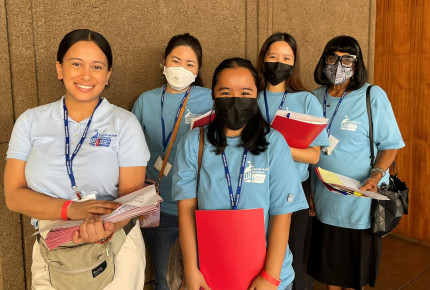 Honolulu, Hawaii – March 16, 2023 -- American Cancer Society Cancer Action Network (ACS CAN) volunteers from across Hawaii met with their legislators to urge them to fund a multiethnic cohort study by the University of Hawaii Cancer Center, the only National Cancer Institute-designated cancer center in the Hawaii Pacific region.
Honolulu, Hawaii – March 16, 2023 -- American Cancer Society Cancer Action Network (ACS CAN) volunteers from across Hawaii met with their legislators to urge them to fund a multiethnic cohort study by the University of Hawaii Cancer Center, the only National Cancer Institute-designated cancer center in the Hawaii Pacific region.
The study would focus on lifestyle habits, environmental exposures, health-related behaviors and social factors that could contribute to cancer disparities among Native Hawaiian, other Pacific Islander individuals and Asian groups, including Filipinos in Hawaii. The collected data will aid in future research to improve health outcomes for these underrepresented populations.
“This study is critical to inform policy that aims to address health inequities, especially in cancer. We need to bring awareness to our diverse communities, provide education and resources to overcome the barriers that prevent us from seeking and receiving the care we need,” said Patricia Kalolaine Cornette, outreach coordinator for the University of Hawaii, a two-time breast cancer survivor and ACS CAN volunteer.
The group of cancer advocates also urged the Legislature to support improving access to audio-only telehealth to help ensure that cancer patients and survivors -- particularly those who live in rural areas and on islands with limited broadband access -- have access to the appropriate medical specialists they may need.
“These communities often face barriers to accessing in-person health care services, such as limited transportation options and lack of health care providers. Audio-only telehealth can help bridge these gaps by providing a convenient, fast and accessible way for patients to connect with their doctors and receive care when they need it,” said Cynthia Au, ACS CAN Hawaii government relations director and grassroots manager.
Additionally, ACS CAN volunteers support repealing the tobacco preemption laws to allow local governments the ability to enact ordinances regulating the sale of tobacco products. Smoking is linked to at least 12 types of cancers, including lung, liver and colorectal cancer.
“Cities, counties and municipalities have been at the forefront of tobacco control policies and it’s crucial they regain local control to enact innovative policies stronger than state laws that are tailored to their unique or pressing needs and concerns,” said Au.
An estimated 8,460 residents of Hawaii will be diagnosed with cancer this year and will begin their fight against the disease. Cancer is the second leading cause of death in Hawaii with an estimated 2,620 deaths this year. It is the leading cause of death among Asian Americans and the second leading cause of death among Native Hawaiian and other Pacific Islander individuals.
 Honolulu, Hawaii – March 16, 2023 -- American Cancer Society Cancer Action Network (ACS CAN) volunteers from across Hawaii met with their legislators to urge them to fund a multiethnic cohort study by the University of Hawaii Cancer Center, the only National Cancer Institute-designated cancer center in the Hawaii Pacific region.
Honolulu, Hawaii – March 16, 2023 -- American Cancer Society Cancer Action Network (ACS CAN) volunteers from across Hawaii met with their legislators to urge them to fund a multiethnic cohort study by the University of Hawaii Cancer Center, the only National Cancer Institute-designated cancer center in the Hawaii Pacific region.